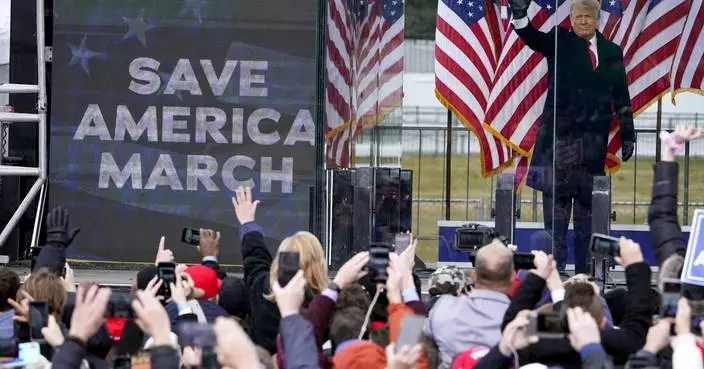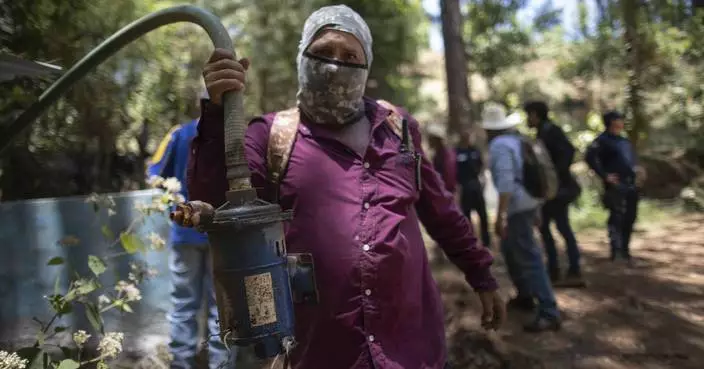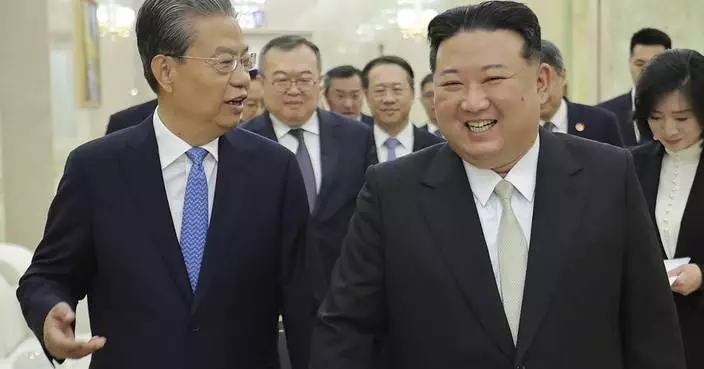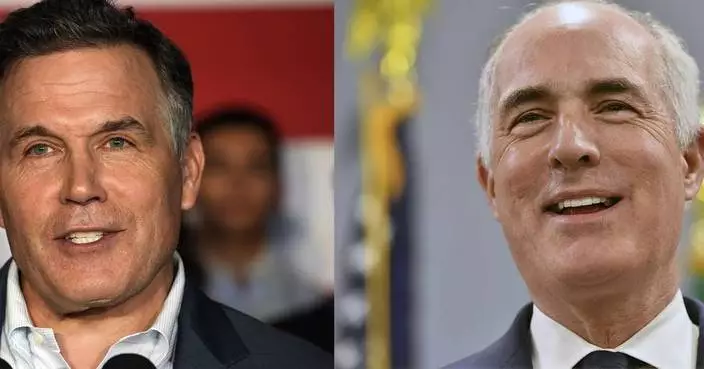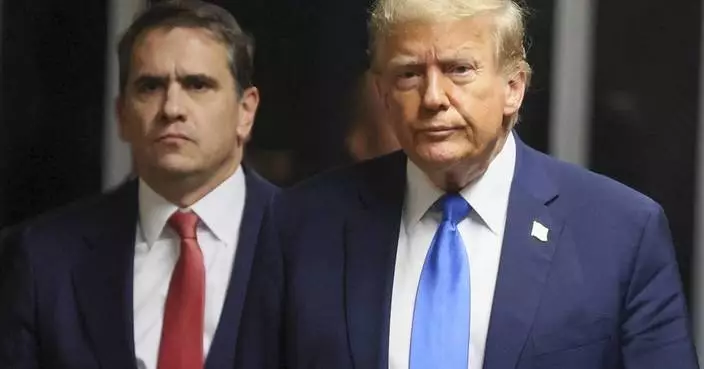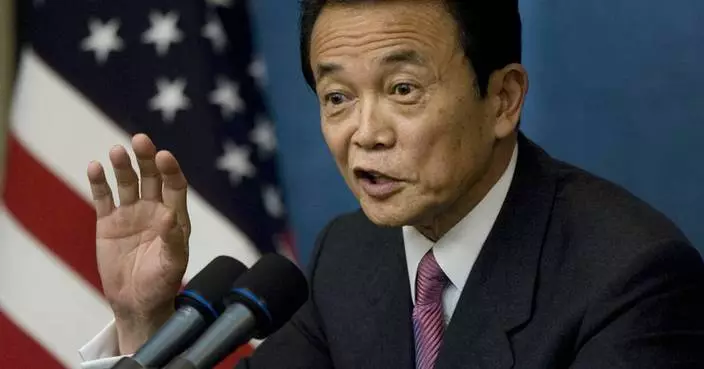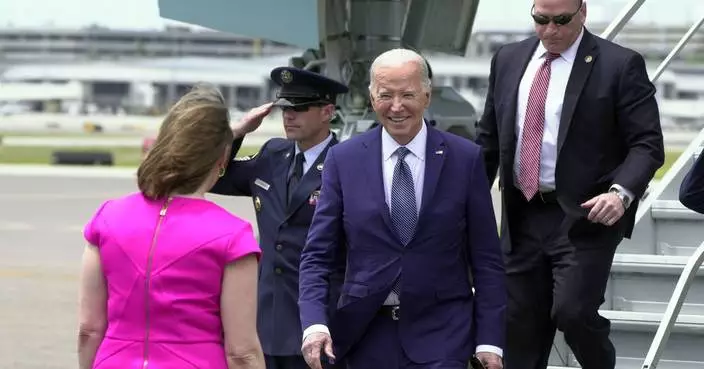North Korea said Friday that it's still willing to sit for talks with the United States "at any time, (in) any format," a remarkably restrained and diplomatic response, from a nation noted for its proud belligerence, to U.S. President Donald Trump's abrupt cancellation of a summit with the North's autocratic leader, Kim Jong Un.
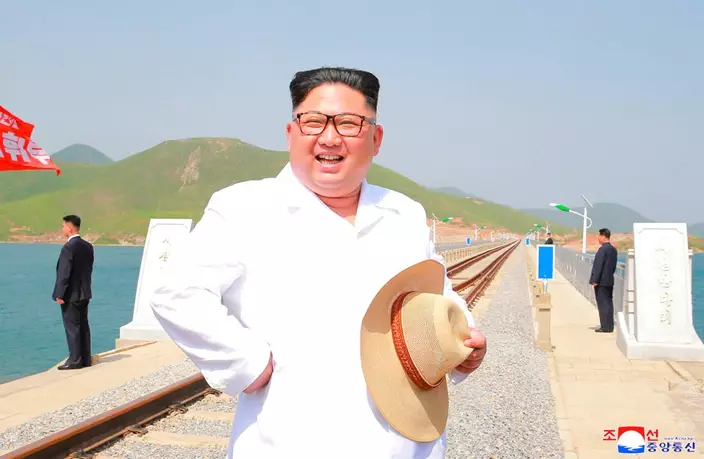
In this undated photo provided on Friday, May 25, 2018, by the North Korean government, North Korean leader Kim Jong Un inspects the completed Koam-Tapchon Railways in Gangwon-do, North Korea. Independent journalists were not given access to cover the event depicted in this image distributed by the North Korean government. The content of this image is as provided and cannot be independently verified. Korean language watermark on image as provided by source reads: "KCNA" which is the abbreviation for Korean Central News Agency. (Korean Central News Agency/Korea News Service via AP)
The statement by Vice Foreign Minister Kim Kye Gwan, a longtime nuclear negotiator and senior diplomat, which said the North is "willing to give the U.S. time and opportunities" to reconsider talks that had been set for June 12 in Singapore, could be driven by a need to use the summit to ease crushing international sanctions, or by a determination that a summit with the mercurial Trump is the best opportunity the North will ever have to elevate itself, and its nuclear program, to equality with its archrival. One analyst marveled that the North Korean response was "close to an apology letter."
Click to Gallery
North Korea said Friday that it's still willing to sit for talks with the United States "at any time, (in) any format," a remarkably restrained and diplomatic response, from a nation noted for its proud belligerence, to U.S. President Donald Trump's abrupt cancellation of a summit with the North's autocratic leader, Kim Jong Un.
The statement by Vice Foreign Minister Kim Kye Gwan, a longtime nuclear negotiator and senior diplomat, which said the North is "willing to give the U.S. time and opportunities" to reconsider talks that had been set for June 12 in Singapore, could be driven by a need to use the summit to ease crushing international sanctions, or by a determination that a summit with the mercurial Trump is the best opportunity the North will ever have to elevate itself, and its nuclear program, to equality with its archrival. One analyst marveled that the North Korean response was "close to an apology letter."
Earlier comments by South Korean President Moon Jae-in, seen as a driving force behind the summit and just returned to Seoul from a meeting with Trump in Washington, suggested that the South, a top U.S. ally and host to 28,500 U.S. troops, was blindsided by Trump's statement. Moon said he was "perplexed" at Trump's announcement that he was canceling the summit because of what the U.S. president said was North Korea's "tremendous anger and open hostility." Moon urged direct talks between Trump and Kim to get things back on track.
Kim Dong-yub, a North Korea expert at Seoul's Institute for Far Eastern Studies, said the North Korean response was notably "courteous, reserved and diplomatically refined," which he said shows that Pyongyang is eager to talk with Washington and believes that the United States needs more time to prepare for the summit.
In his statement to the North, Trump said: "If you change your mind having to do with this most important summit, please do not hesitate to call me or write."
Protesters with a portrait of U.S. President Donald Trump stage a rally against the United States' policies near the U.S. embassy in Seoul, South Korea, Friday, May 25, 2018. North Korea said Friday that it's still willing to sit down for talks with the United States "at any time, at any format" just hours after President Donald Trump abruptly canceled his planned summit with the North's leader Kim Jong Un. (AP Photo/Ahn Young-joon)
Regardless of the motivation, Kim Kye Gwan's statement is the latest whiplash development in efforts to diplomatically address what might be the world's most dangerous standoff. Focus will now swing back to how Trump will respond to the North's seemingly conciliatory gesture.
The stakes are high. A scrapping of diplomacy could see a return to the torrent of weapons tests — and the fears of war they created — that North Korea unleashed last year as it sought to put the finishing touches on a nuclear-armed missile program meant to target the entire U.S. mainland. Since January, Kim has taken a radically softer approach to foreign affairs, sending his sister to the Olympics in South Korea, meeting with his South Korean counterpart on their shared border and exploding parts of his nuclear testing site Thursday in an apparent sign of good faith. The Singapore summit would have been the culmination of this outreach.
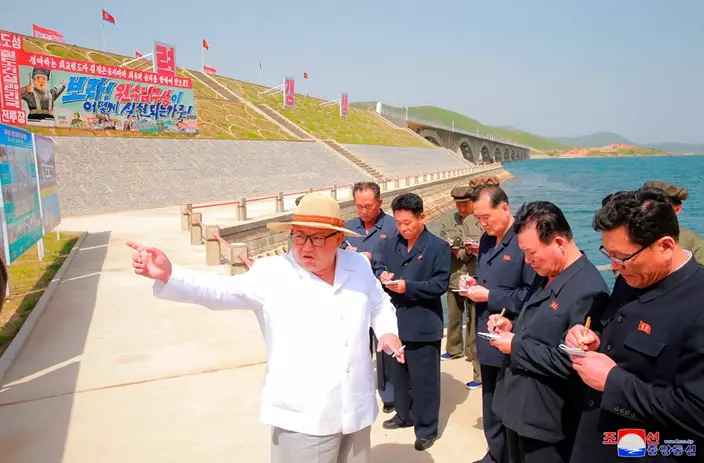
In this undated photo provided on Friday, May 25, 2018, by the North Korean government, North Korean leader Kim Jong Un inspects the completed Koam-Tapchon Railways in Gangwon-do, North Korea. Independent journalists were not given access to cover the event depicted in this image distributed by the North Korean government. The content of this image is as provided and cannot be independently verified. Korean language watermark on image as provided by source reads: "KCNA" which is the abbreviation for Korean Central News Agency. (Korean Central News Agency/Korea News Service via AP)
Earlier comments by South Korean President Moon Jae-in, seen as a driving force behind the summit and just returned to Seoul from a meeting with Trump in Washington, suggested that the South, a top U.S. ally and host to 28,500 U.S. troops, was blindsided by Trump's statement. Moon said he was "perplexed" at Trump's announcement that he was canceling the summit because of what the U.S. president said was North Korea's "tremendous anger and open hostility." Moon urged direct talks between Trump and Kim to get things back on track.
Many observers had expected a belligerent North Korean response to Trump's cancellation, but the comments by Kim, the North's vice foreign minister, seemed, at times, almost meek, and in stark contrast to the bellicose declarations last year of the North's willingness to pursue nuclear war.
Kim said Pyongyang's "objective and resolve to do our best for the sake of peace and stability of the Korean Peninsula and all humankind remain unchanged." Kim said the cancellation of the talks shows "how grave the status of historically deep-rooted hostile North Korea-U.S. relations is and how urgently a summit should be realized to improve ties."
"As far as the historic (North Korea)-U.S. summit is concerned, we have inwardly highly appreciated President Trump for having made the bold decision, which any other U.S. presidents dared not, and made efforts for such a crucial event as the summit," Kim said. "His sudden and unilateral announcement to cancel the summit is something unexpected to us and we cannot but feel great regret for it."
Kim speculated that Trump may have "lacked the will for the summit or he might not have felt confident," but that the North has "exerted sincere efforts" for talks that "would mark a meaningful starting point for peace and security in the region and the world."
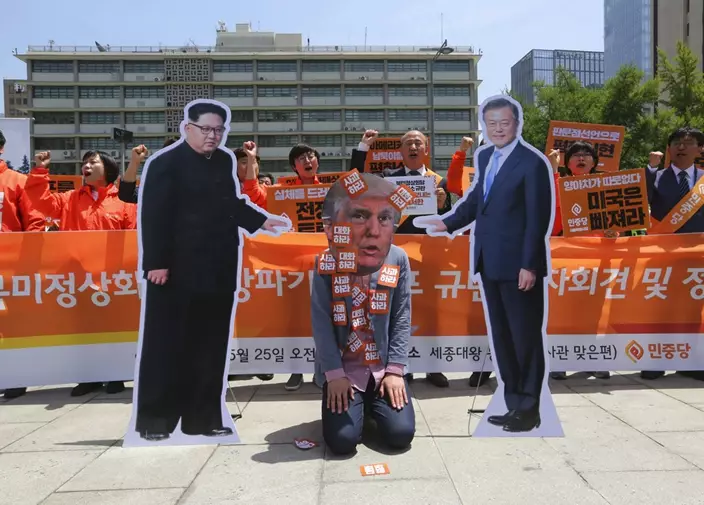
A protester wearing a mask of U.S. President Donald Trump, center, performs with cut-out photos of North Korean leader Kim Jong Un and South Korean President Moon Jae-in, right, during a rally against the United States' policies against North Korea near the U.S. embassy in Seoul, South Korea, Friday May, 25, 2018. North Korea said Friday that it's still willing to sit down for talks with the United States "at any time, at any format" just hours after President Donald Trump abruptly canceled his planned summit with the North's leader Kim Jong Un. The signs read " Apology." (AP Photo/Ahn Young-joon)
Kim Dong-yub, a North Korea expert at Seoul's Institute for Far Eastern Studies, said the North Korean response was notably "courteous, reserved and diplomatically refined," which he said shows that Pyongyang is eager to talk with Washington and believes that the United States needs more time to prepare for the summit.
Trump's cancellation of the summit came amid mounting skepticism about the North's sincerity after the country's earlier threats to scrap the Kim-Trump summit. That may have been aimed at bolstering its negotiating position, rather than killing the meeting.
"They wanted to face the United States in a more confident position. Obama or (Bill) Clinton could have accepted (these kinds of North Korean statements). But it's Trump. He's decided not to enter talks while being pushed (by North Korea) like this," said Choi Kang, vice president of Seoul's Asan Institute for Policy Studies.
Koh Yu-hwan, a professor at Seoul's Dongguk University, said Kim's statement was "close to an apology letter."
The North might have also sensed an opening in Trump's seemingly mixed messages.
"I really believe Kim Jong Un wants to do what's right," the U.S. president said at one point. Trump also said from the White House that a "maximum pressure campaign" of economic sanctions and diplomatic isolation would continue against North Korea — with which the U.S. is technically still at war — but he added that it was possible the summit could still take place at some point.
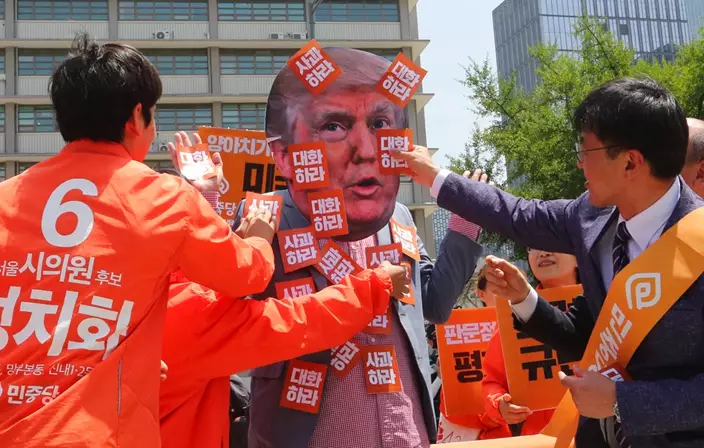
Protesters attach stickers at their fellow protester wearing a mask of U.S. President Donald Trump during a rally against the United States' policies against North Korea near the U.S. Embassy in Seoul, South Korea, Friday May 25, 2018. North Korea said Friday that it's still willing to sit down for talks with the United States "at any time, at any format" just hours after President Donald Trump abruptly canceled his planned summit with the North's leader Kim Jong Un. The signs read " Apology." (AP Photo/Ahn Young-joon)
In his statement to the North, Trump said: "If you change your mind having to do with this most important summit, please do not hesitate to call me or write."
It was unclear whether Trump was engaged in what he saw as a negotiating ploy or if his moves were a manifestation of mounting internal concerns over ensuring a successful outcome for the summit.
While the statement may keep the possibility of a summit alive, there were also hints in North Korea's response to Trump that Pyongyang was willing to walk away.
Kim said the United States is at fault for what Trump described as North Korea's "hostility," saying that Pyongyang was responding to "excessive" U.S. comments pressuring the country to "unilaterally discard" its nuclear weapons ahead of the summit. Trump's move to cancel the summit has forced the North to "rethink whether the efforts we have so far put in and the new path we have taken is the right choice."
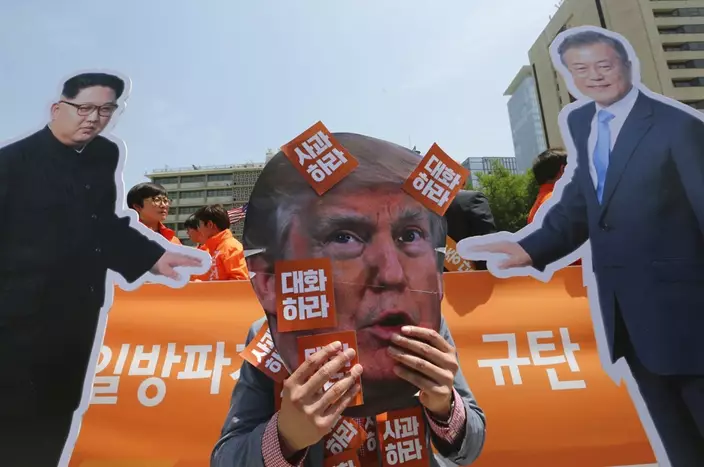
A protester wearing a mask of U.S. President Donald Trump, center, performs with cut-out photos of North Korean leader Kim Jong Un and South Korean President Moon Jae-in, right, during a rally against the United States' policies against North Korea near the U.S. embassy in Seoul, South Korea, Friday, May 25, 2018. North Korea said Friday that it's still willing to sit down for talks with the United States "at any time, at any format" just hours after President Donald Trump abruptly canceled his planned summit with the North's leader Kim Jong Un. The signs read " Apology." (AP Photo/Ahn Young-joon)
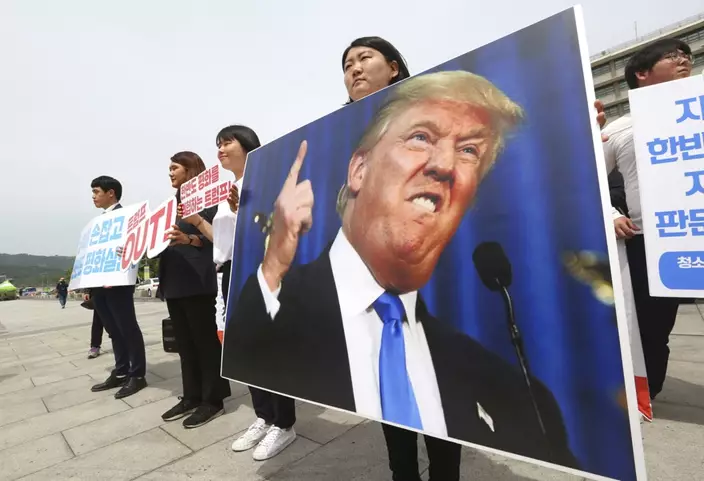
Protesters with a portrait of U.S. President Donald Trump stage a rally against the United States' policies near the U.S. embassy in Seoul, South Korea, Friday, May 25, 2018. North Korea said Friday that it's still willing to sit down for talks with the United States "at any time, at any format" just hours after President Donald Trump abruptly canceled his planned summit with the North's leader Kim Jong Un. (AP Photo/Ahn Young-joon)
WASHINGTON (AP) — For Senate Republican leader Mitch McConnell and House Speaker Mike Johnson, the necessity of providing Ukraine with weapons and other aid as it fends off Russia's invasion is rooted in their earliest and most formative political memories.
McConnell, 82, tells the story of his father’s letters from Eastern Europe in 1945, at the end of World War II, when the foot soldier observed that the Russians were “going to be a big problem” before the communist takeover to come. Johnson, 30 years younger, came of age as the Cold War was ending.
As both men pushed their party this week to support a $95 billion aid package that sends support to Ukraine, as well as Israel, Taiwan and humanitarian missions, they labeled themselves “Reagan Republicans” an described the fight against Russian President Vladimir Putin in terms of U.S. strength and leadership. But the all-out effort to get the legislation through Congress left both of them grappling with an entirely new Republican Party shaped by former President Donald Trump.
While McConnell, R-Ky., and Johnson, R-La., took different approaches to handling Trump, the presumptive White House nominee in 2024, the struggle highlighted the fundamental battle within the GOP: Will conservatives continue their march toward Trump’s “America First” doctrine on foreign affairs or will they find the value in standing with America's allies? And is the GOP still the party of Ronald Reagan?
“I think we’re having an internal debate about that,” McConnell said in an interview with The Associated Press. “I’m a Reagan guy and I think today — at least on this episode — we turned the tables on the isolationists.”
Still, he acknowledged, “that doesn’t mean they’re going to go away forever.”
McConnell, in the twilight of his 18-year tenure as Republican leader, lauded a momentary victory Tuesday as a healthy showing of 31 Republicans voted for the foreign aid; that was nine more than had supported it in February. He said that was a trend in the right direction.
McConnell, who has been in the Senate since 1985, said passing the legislation was “one of the most important things I’ve ever dealt with where I had an impact."
But it wasn’t without cost.
He said last month he would step away from his job as leader next year after internal clashes over the money for Ukraine and the direction of the party.
For Johnson, just six months into his job as speaker, the political crosscurrents are even more difficult. He is clinging to his leadership post as right-wing Republicans threaten to oust him for putting the aid to Ukraine to a vote. While McConnell has embraced American leadership abroad his entire career, Johnson only recently gave complete support to the package.
Johnson has been careful not to portray passage as a triumph when a majority of his own House Republicans opposed the bill. He skipped a celebratory news conference afterward, describing it as “not a perfect piece of legislation” in brief remarks.
But he also borrowed terms popularized by Reagan, saying aggression from Russia, China and Iran “threatens the free world and it demands American leadership.”
“If we turn our backs right now, the consequences could be devastating,” he said.
Hard-line conservatives, including some who are threatening a snap vote on his leadership, are irate, saying the aid was vastly out of line with what Republican voters want. They condemned both Johnson and McConnell for supporting it.
“House Republican leadership sold out Americans and passed a bill that sends $95 billion to other countries,” said Republican Sen. Tommy Tuberville of Alabama, who opposed the bill. He said the legislation "undermines America's interests abroad and paves our nation's path to bankruptcy.”
Johnson has been lauded by much of Washington for doing what he called “the right thing" at a perilous moment for himself and the world.
“He is fundamentally an honorable person,” said Senate Majority Leader Chuck Schumer, D-N.Y., who brokered the negotiations and spent hours on the phone and in meetings with Johnson, McConnell and the White House.
Sen. Mitt Romney, R-Utah, said Johnson and McConnell “both showed great resolve and backbone and true leadership at a time it was desperately needed.”
When McConnell began negotiations over President Joe Biden's initial aid request last year, he quickly set the terms for a deal. He and Schumer agreed to pair any aid for Ukraine with help for Israel, Schumer said, and McConnell demanded policy changes at the U.S. border with Mexico.
On McConnell's mind, he said, was that Trump was “unenthusiastic” about providing more aid to Kyiv. Yet McConnell, whose office displays a portrait of every Republican president since Reagan with the exception of Trump, had a virtually nonexistent relationship with the man he often refers to not by name, but simply as “the former president.”
Still, Trump would prove to hold powerful sway. When a deal on border security neared completion after months of work, Trump eviscerated the proposal as insufficient and a “gift” to Biden's reelection. Conservatives, including Johnson, rejected it out of hand.
With the border deal dead, McConnell pushed ahead with Schumer on the foreign aid, with the border policies stripped out, solidifying their unusual alliance. The Senate leaders met weekly throughout the negotiation.
“We disagreed on a whole lot, but we really stuck together,” Schumer said.
“We just persisted. We could not give up on this."
Meanwhile, a small group of GOP senators began working on an idea they thought could give Johnson some political wiggle room. Sens. Lindsey Graham of South Carolina, Kevin Cramer of North Dakota and Markwayne Mullin of Oklahoma took an idea that Trump had raised — structuring the aid to Ukraine as a loan — and tried to make it reality.
Through a series of phone calls with Trump, several House members, as well as the speaker, they worked to structure roughly $9 billion in economic aid for Ukraine as forgivable loans — just as it was in the final package.
“Our approach this time was to make sure that the politics were set, meaning that President Trump is on board,” Mullin said.
The conversations culminated in Johnson making a quick jaunt to Florida, where he stood side by side with Trump at his Florida club just days before moving ahead with the Ukraine legislation in the House.
It was all enough, with Democratic help, to get the bill across the finish line. The legislation, which Biden signed into law on Wednesday, included some revisions from the Senate bill, including the loan structure and a provision to seize frozen Russian central bank assets to rebuild Ukraine. Nine GOP senators who had opposed the first version of the bill swung to “yes” largely because of the changes Johnson had made.
The result was a strong showing for the foreign aid in the Senate, even though the decision could prove costly for Johnson.
What comes next on Ukraine is anyone's guess.
While the $61 billion for Ukraine in the package is expected to help the country withstand Moscow's offensive this year, more assistance will surely be needed. Republicans, exhausted after a grueling fight, largely shrugged off questions about the future.
“This one wasn’t easy,” Mullin said.
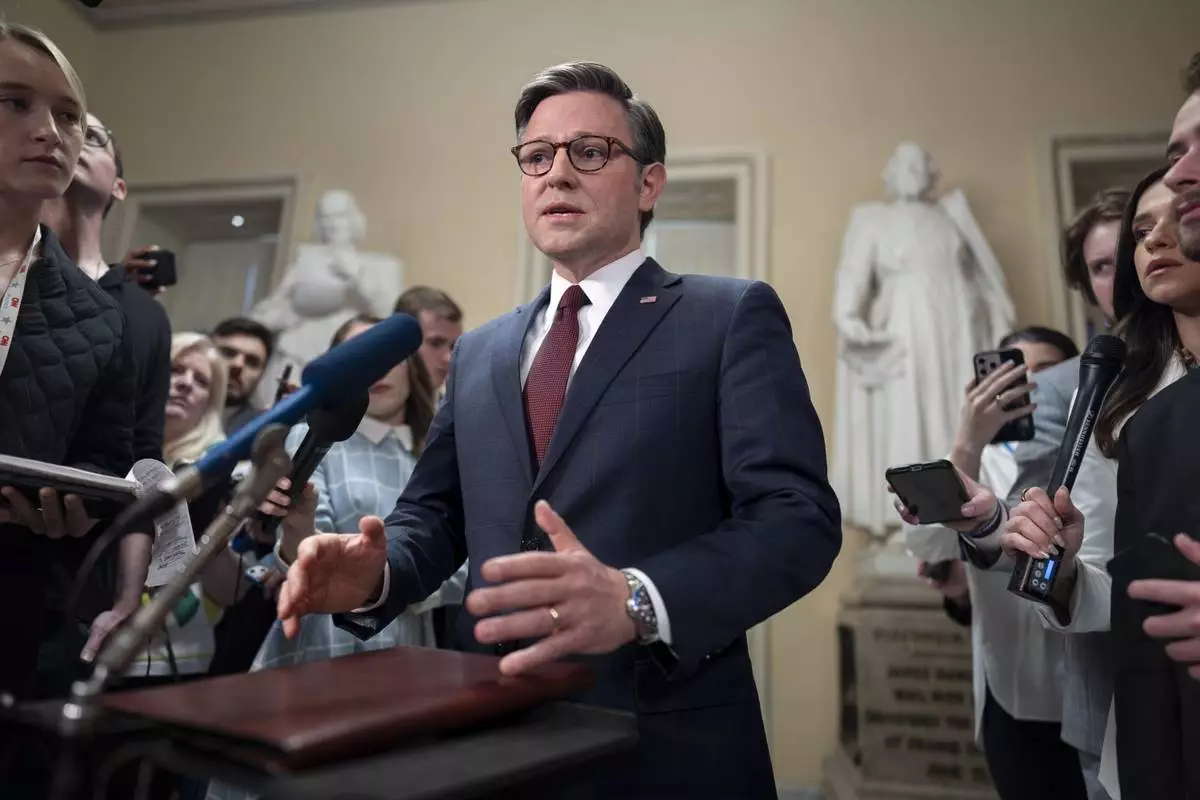
Speaker of the House Mike Johnson, R-La., talks to reporters just after the House voted to approve $95 billion in foreign aid for Ukraine, Israel and other U.S. allies, at the Capitol in Washington, Saturday, April 20, 2024. (AP Photo/J. Scott Applewhite)
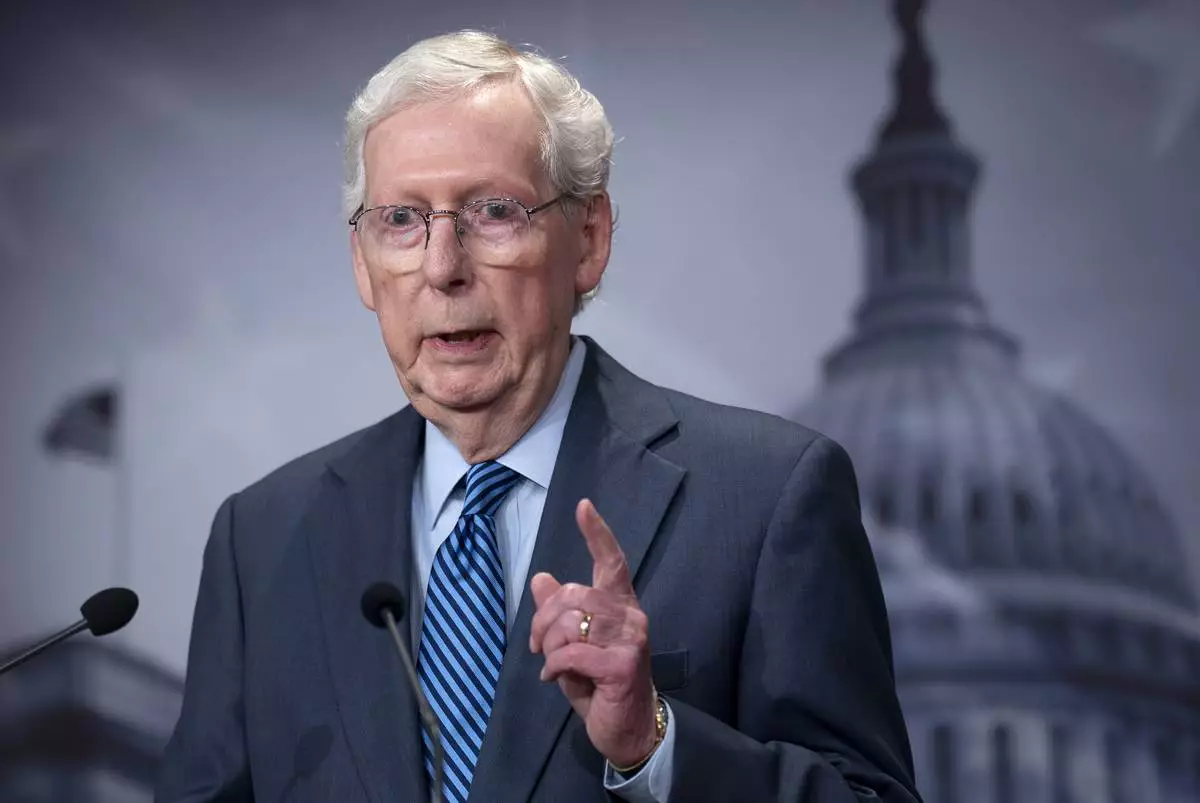
Senate Minority Leader Mitch McConnell, R-Ky., praises support for Ukraine as the Senate is on track to pass $95 billion in war aid to Ukraine, Israel and Taiwan, at the Capitol in Washington, Tuesday, April 23, 2024. (AP Photo/J. Scott Applewhite)
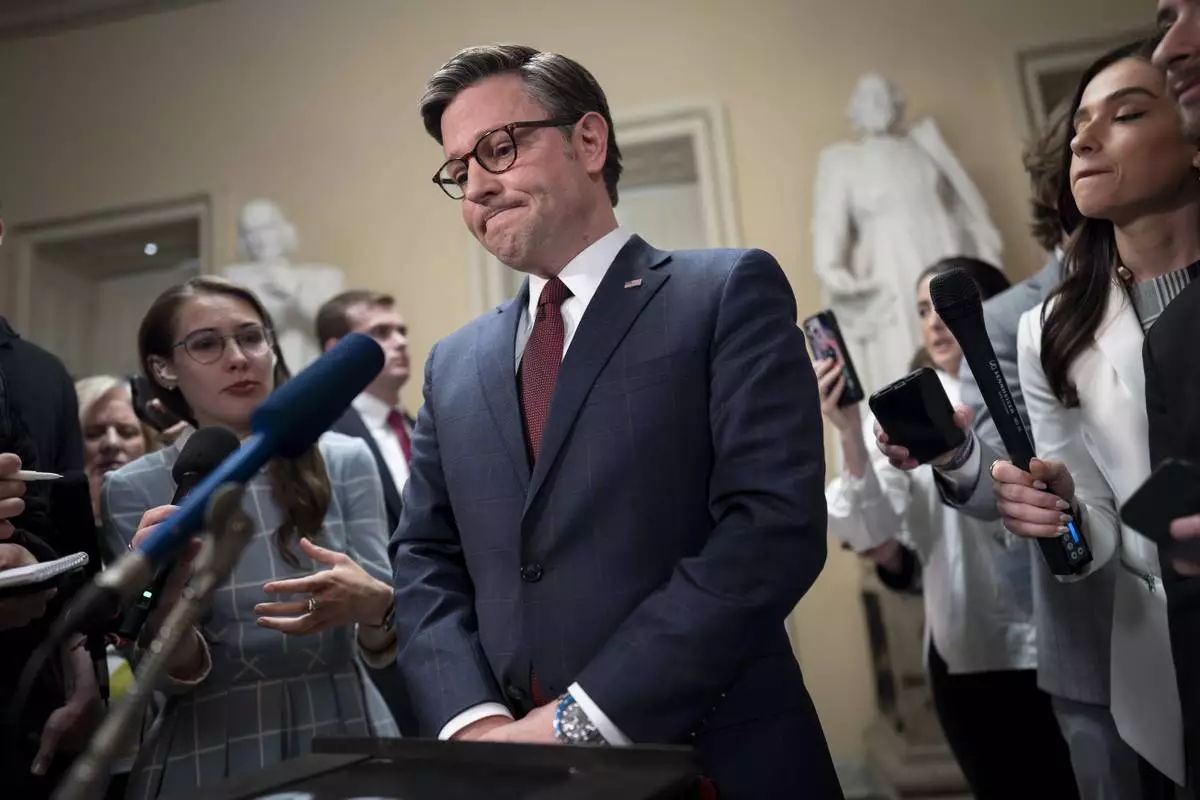
Speaker of the House Mike Johnson, R-La., talks to reporters just after the House voted to approve $95 billion in foreign aid for Ukraine, Israel and other U.S. allies, at the Capitol in Washington, Saturday, April 20, 2024. (AP Photo/J. Scott Applewhite)
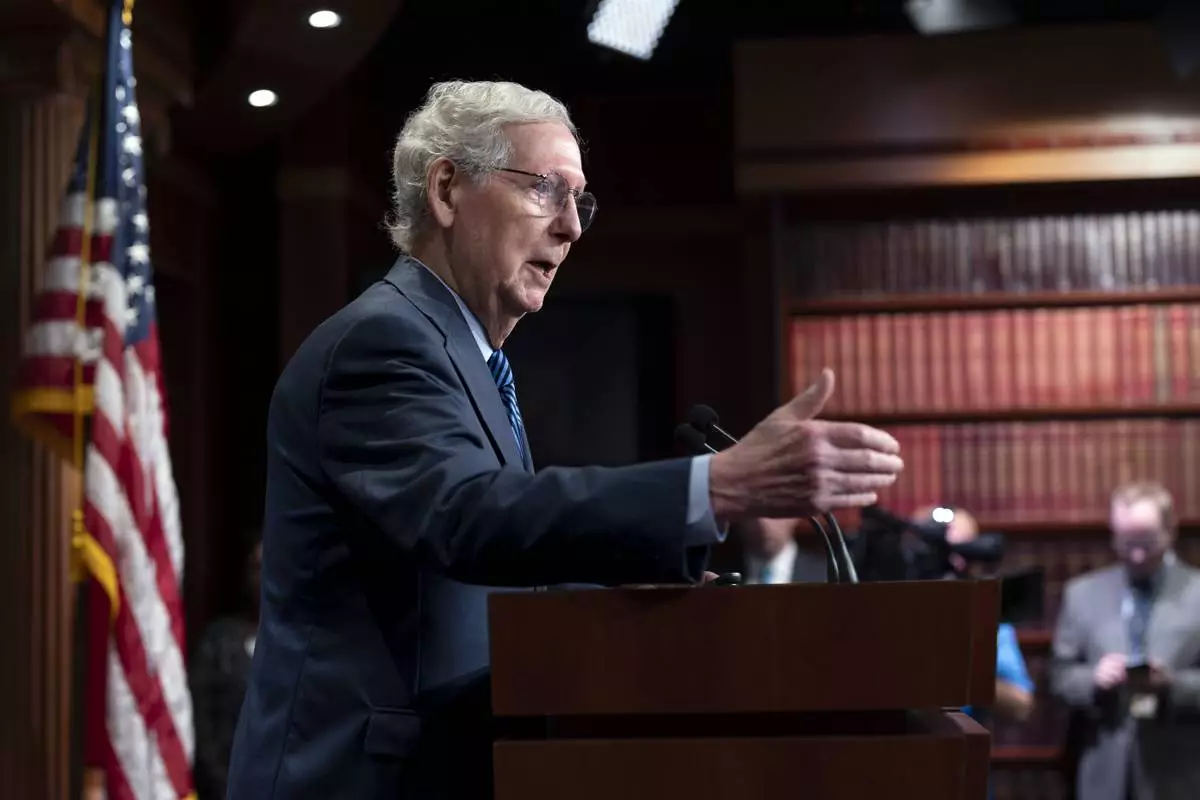
Senate Minority Leader Mitch McConnell, R-Ky., praises support for Ukraine as the Senate is on track to pass $95 billion in war aid to Ukraine, Israel and Taiwan, at the Capitol in Washington, Tuesday, April 23, 2024. (AP Photo/J. Scott Applewhite)
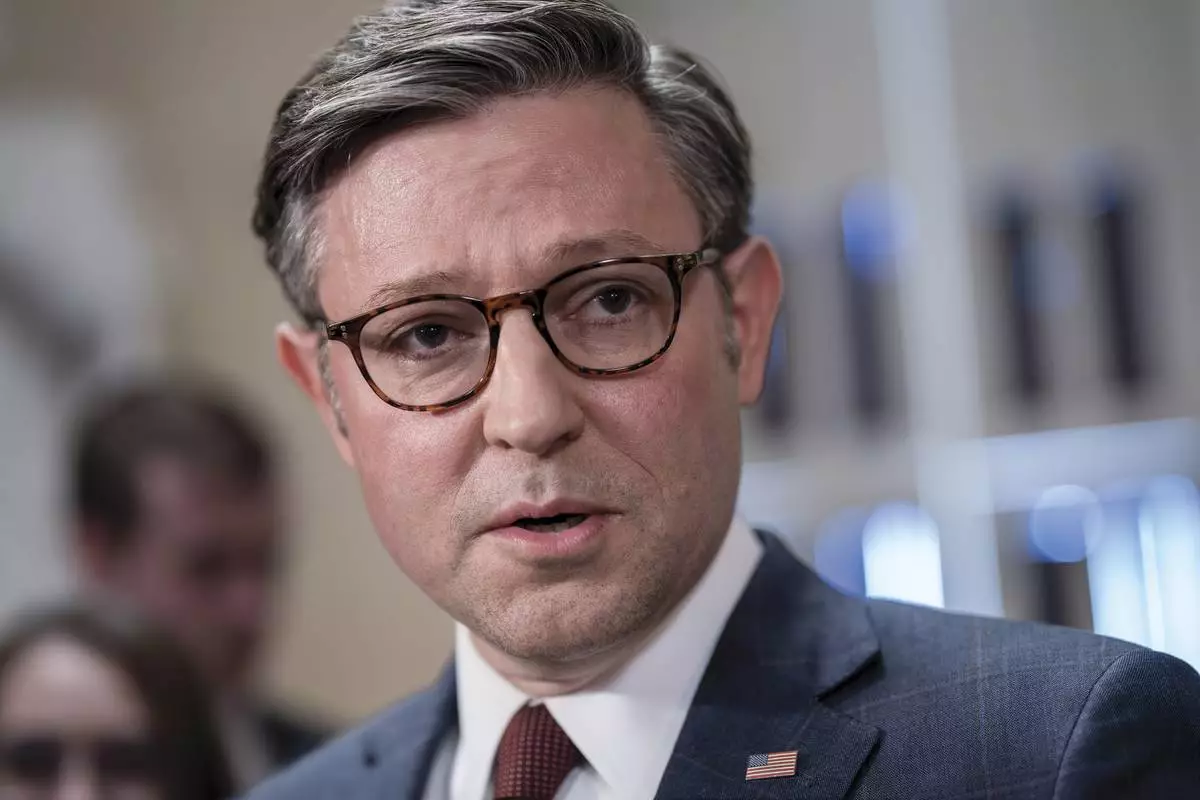
Speaker of the House Mike Johnson, R-La., talks to reporters just after the House voted to approve $95 billion in foreign aid for Ukraine, Israel and other U.S. allies, at the Capitol in Washington, Saturday, April 20, 2024. (AP Photo/J. Scott Applewhite)
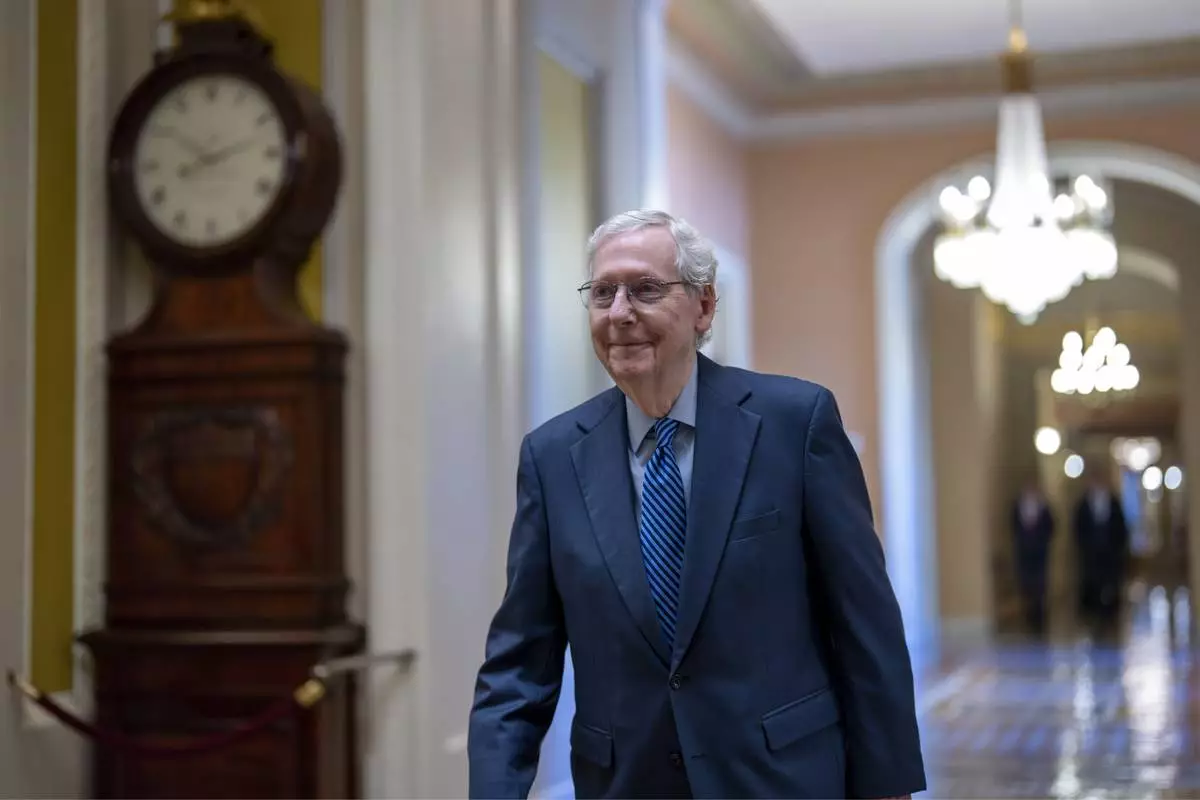
Senate Minority Leader Mitch McConnell, R-Ky., walks to the chamber as the Senate prepares to advance the $95 billion aid package for Ukraine, Israel and Taiwan passed by the House, at the Capitol in Washington, Tuesday, April 23, 2024. (AP Photo/J. Scott Applewhite)















